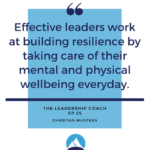One Powerful Leadership Lesson From President Trump

 While facilitating a leadership workshop, I had broken the large group up into a half-dozen small groups. They were deeply engrossed in a role play we were doing on negotiation skills. They ignored me as I walked around the room taking pictures.
While facilitating a leadership workshop, I had broken the large group up into a half-dozen small groups. They were deeply engrossed in a role play we were doing on negotiation skills. They ignored me as I walked around the room taking pictures.
Upon completion, we would debrief the exercise. The group was very interested to see who was able to make the most progress in the negotiation and how. But a larger point that I wanted to make was about influence.
Leaders have influence. Arguably more influence over more people, than others. But for most leaders, the nature or quality of our influence is accidental. We aren’t really aware of the impact we have on others.
To illustrate that point, I described to the group a phenomenon that I had anticipated. Each small group had subconsciously begun to mimic each other’s physical posture and positioning. This is what I was photographing as I walked around the room.
The phenomenon is called “limbic synchrony” or mirroring. This dynamic has been observed for a very long time. But in the 1990’s, scientists in Italy discovered that our brains actually have “mirror neurons.” We are literally built to mirror the attitudes, emotions and behaviors of others.
There is still much that we don’t understand about mirror neurons. But their existence helps explain at least part of how one human being influences another (or may others.) Many didn’t believe me. After all, these were experienced, independent-minded leaders. So, I showed them the pictures I had taken:
• In one group, most are leaning back in the chairs, with their arms behind their head.
• In another they are all leaning forward with their chin resting on a fist.
• In other they all have their legs crossed at the ankles.
• And so on…
My point: As leaders, we influence others. One person in each group had greater physical influence than the others. The influence is often profound. And it often goes beyond physical mimicry to attitudes, behaviors, and beliefs.
But, as in the workshop above, neither the influencer nor the influenced may be aware of it.
Trump, our congress, the media, and a culture of disrespect
It seems impossible to reference President Trump or the Congress or the media and not be interpreted as making a political statement. I’m just going to say I’m not making a political statement. This is an observation about leadership and mirroring.
Love or hate President Trump, he is an extraordinarily powerful influencer. I think it is fascinating to see the influence he has had over those who seem to be his most committed opposition.
View it as transparency or a lack of filter – Trump appears to be comfortable with his inner monologue being out in the open. And many of his ruminations seem to focus on his opinions of others. These are often (not always) scathing.
One of the few things, about Trump, that most people can agree on is that he doesn’t pull punches and is not afraid to take shots at others – cheap or otherwise.
He doesn’t make a habit out of demonstrating respect. It’s not that he can’t relate to others respectfully or never does. But it doesn’t appear to be his “go-to” approach. Instead, much of what he says or tweets just comes out raw, highly personalized, and mocking.
And so many others are following suit.
Congressional leaders and the media (left or right) have largely given up most pretenses of propriety or decorum. Their critique of Trump (and anyone else under their lens of disapproval) is rarely on matters of substance but increasingly personal.
Instead of debating or exploring the merits of any particular question, issue or policy – the tendency is to make a personal attack on an individual or group. Attacks on intelligence, morality, physical attributes, competence, relationships, social standing and so on. It’s all fair game and it’s all over the place.
While there was never a golden of age gentle and caring differences and disagreements – it seems now that the principle “go-to” options are to denounce, demean, dismiss and despise.
Like it or not, many of us are mirroring Trump. If not in his specifics, in his attitude.
Like it or not, the people we lead or influence, mirror us.
Do we like what we see in the mirror?
My purpose, here, isn’t to provide a commentary on President Trump or the state of the nation. You don’t need to agree with my interpretation. My purpose is to point out, what I see as, an extremely powerful example of the dynamics of influence.
If this concept speaks to you, here are three questions to ask yourself, so that you can be intentional (and hopefully constructive) in your leadership.
What is being reflected back to you?
When you look at the attitudes and behaviors of those you lead – are you happy with what you see? Your team, especially the people who work closest to you, are often the strongest and most accurate barometer of yourself as a leader. What they pick up and reflect may not at all be something that you intended or ever were aware of.
But this influence extends beyond your immediate team. I commonly work with clients whose frontline staff, who may not even know their senior leadership, reflect the values, attitudes and behaviors of those leaders.
Are you happy with what is being reflected back to you? If you aren’t, it is a very wise starting point to consider what you are putting out there.
What are you reflecting back to others?
Charles Cooley, in his theory of the “Looking Glass Self,” observed that most people’s self-image and sense of self-worth is built out of how they believe others see them. This obviously begins with the parents and the family. But, as we grow up extends to teachers, peers, society, and so on.
Leaders, who have been social influencers since before social media was a thing, can have significant influence in this way.
The self-image of those you lead and influence is often shaped by what they “see reflected in your eyes” when you look at them. Some of this has to do with their interpretation of you. But a lot of it just has to do with you.
How are you trying to shape and build your people? What “reflections” do people see of themselves when they interact with you?
What can you do to ensure that these reflections are building your people up?
Who are your mirrors?
Jim Rohn is often quoted as saying, “You are the average of the five people you spend the most time with.” As a leader, you don’t escape being influenced yourself.
Recent research shows that we may be even more influenced than just the five closest to us. The Framingham Heart Study was begun in 1948. It has tracked over 5,000 participants, over four generations, to try to understand heart health.
Part of what it has demonstrated is how people influence others: If a friend of yours becomes obese, you are 45% more likely to become obese yourself. But if a friend of a friend becomes obese, you are still 20% more likely to become obese as well.
This dynamic has been shown with other behaviors and attitudes as well – such as smoking and happiness. Friends impact you greatly but friends of friends (who you may not know) impact you as well.
This reinforces my earlier observation about front-line staff who mimic attitudes and behaviors of senior leaders they don’t necessarily know.
As much as leaders like to think of themselves as captains of their own ships – we are often very heavily influenced by others. And not necessarily just those closest to us. And in ways that we may not expect.
This suggests that we should be very selective about the people and influences we allow into our lives. I’ve observed that my highest performing clients often do this naturally. They carefully curate their relationships as well as the media messages they expose themselves to.
Who influences you? Who shapes your image of yourself? Is it what you want?
One of the most powerful ways to continue to grow is to ensure that you are always being influenced by people who are who you hope to become.
Our mirrors shape us and shape how we shape others
Being intentional about how we are shaped and influenced is, in some ways, the easiest way to be intentional about the influence we have over others.
It is very hard to act and be different than the relationships we surround yourself with and the messages we immerse our self in. We tend to become what we expose ourselves to.
So, make sure that you are surrounded by and immersed in what you want to become.
Keep well,
Christian
Please join me on my social media channels:
![]()
![]()
![]()
![]()
![]()

Find the value of your company with my free assessment tool: The Value Builder System
The Value Builder System™ is a 13-minute online questionnaire that evaluates your business on the eight factors that contribute more to its attractiveness and value. These factors are scored on a scale of 1-100. Businesses that score over 80 are likely to command 70%-100% higher value than others.
 In my podcast, THE LEADERSHIP COACH, we explore effective, high impact and enjoyable leadership. We talk about personal development and the attributes that all effective leaders possess. I interview other leadership experts who share their knowledge and tips to help you build the confidence to lead and learn the habits of good decision-making.
In my podcast, THE LEADERSHIP COACH, we explore effective, high impact and enjoyable leadership. We talk about personal development and the attributes that all effective leaders possess. I interview other leadership experts who share their knowledge and tips to help you build the confidence to lead and learn the habits of good decision-making.
Opportunities
Free Resource: How To Accomplish More Without Doing More is a workbook I created to walk leaders through a process of helping you own your calendar, liberate your time, and still get more done. Download it for free!
Executive and Leadership Coaching: Do you feel overwhelmed? Are you not getting the results you expect from the effort you are putting in? Do you find yourself facing similar challenges time and time again? Would you like to change specific ways of relating or reacting? If you would like to experience predictable, measurable growth Contact me.
Profitable Exit Strategy Workshop: Are you a business owner or partner? Are you over 55? Are you starting to think about exiting your business or active management in the next 3-5 years?
- Are you curious about what your business might be worth?
- Would you like to discover the specific steps you need to take to increase its value and become highly attractive to a buyer?
- Are you planning on handing it over to family or employees and you want to ensure long-term success?
If so, contact me now
Article Categories
Popular articles

Download my free 10-page eBook:
How To Accomplish More Without Doing More:
Eight Proven Strategies To Change Your Life
Discover how to save eight hours during your workweek-even if you're too busy to even think about it. The resource every maxed out executive needs.
